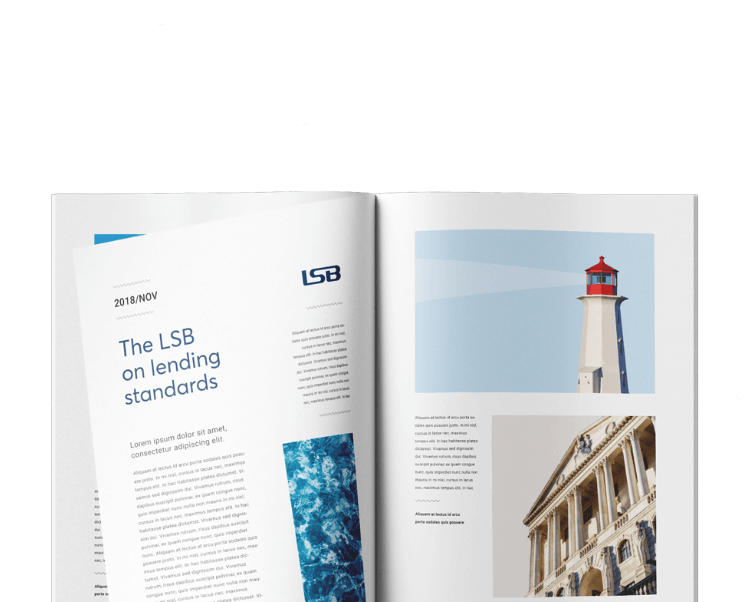Download a copy of this thought piece here.
A perfect storm of inflation, increased energy costs, and the impact of interest rate and tax rises is contributing to what is being widely referred to as the cost of living crisis within the UK. Charities have said that the real term cost on customers is pushing many into serious financial difficulties[1] and some even risk homelessness.[2] With this in mind, it is vital that registered firms and the wider financial services sector look at what can be done mitigate the risk of customer harm. Within this piece, we present considerations for firms in relation to how they support customers in pre-arrears and financial difficulty.
How does this relate to the Standards?
The Standards of Lending Practice (The Standards) require firms to ensure that the risk of financial difficulties is minimised by taking steps throughout the product and service lifecycle, from design through to account management. Within the design stage, registered firms should ‘take into account internal and external risks which could impact upon a customer’s ability to maintain their repayments.’[3] As described in the Information for Practitioners, this includes considering how ‘wider economic’ factors could impact the customer’s ability to repay.[4] These factors would include interest rate rises or other increases in the cost of living.
Registered firms are expected to identify signs of financial difficulty and then offer appropriate support to affected customers. Firms should ‘pro-actively encourage customers to get in contact if there has been a change in their circumstances which may impact on their ability to repay their borrowing.’[5] Firms should consider this in relation to the communications it presents to customers relating to financial difficulty and money management, along with the channels it offers for customers to contact support.
If difficulties are identified, firms need to provide customers with ‘appropriate support and fair treatment.’[6] When interacting with a registered firm, customers should have confidence that they will be dealt with empathetically and in a responsive manner. In the piece below, we have detailed considerations for firms to promote the delivery of fair customer outcomes during this challenging time. Firms should also read the Information for Practitioners to take advantage of the additional insight it provides on how to adhere to the Standards.
Policy and process
Firms need to have a well-designed and effective financial difficulties policy and process in place to deliver appropriate customer support. This will be vital to enable firms to provide the right solutions to those customers facing hardship as a result of the cost of living crisis. To best support customers, the first line needs to work within a set framework of policy and process. This leads to successfully identifying those in financial difficulty to offer forbearance, signposting, or any other help that may be needed.
Processes should be clear and easily followed to ensure that there is a pathway that the firm has agreed is the best way to deliver support. However, advisers also need to be able to respond to individual situations and this will sometimes mean having to act flexibly rather than being hamstrung by an overly process driven approach. Escalation points, where advisers can seek assistance from management or other support, should be readily available for when a customer’s situation does not fit the process or when the adviser is unsure how to proceed.
Policy and process documents should be subject to regular reviews to ensure both accuracy and efficacy. Having named individuals or departments responsible for these reviews minimises the risk of them being missed. The outcome of reviews, for example, suggestions on how changes could improve the journey, should be reported (such as to the Credit/Financial Difficulties Committee or equivalent) to provide oversight of the internal governance process.
Reporting
Senior management need to be confident that they know how customers are being treated and this is especially important when it comes to financial difficulties. This confidence is gained through regular reporting to Committees and other similar governance functions, with management information (MI), customer reviews, and other insight provided to demonstrate the delivered outcomes.
As the cost of living crisis is an emerging risk that will continue to develop, it is especially important that MI captures potential triggers or data points that can be used to determine how the firm is supporting customers. These will likely relate to financial difficulty and the support offered to customers in pre-arrears or collections. However, there may be new data points available that could shed light on customer outcomes. These could include, for example, whether customers that firms know are in receipt of benefit payments are entering difficulties more frequently than was the case twelve months ago.[7] If so, steps should be taken to investigate why and what could be done to mitigate this.
Regularly reviewing and requesting feedback on internal reporting packs can be beneficial. This provides a clear opportunity for management to comment on where they feel they have a good understanding and perhaps where excess information can be trimmed. The LSB has seen examples within firms of reporting packs that were so long it would take an unrealistic amount of time and attention to review thoroughly. In such instances, firms need to transition to more impactful and concise reporting which focuses on customer outcomes and associated risks.
Having a robust MI reporting process will play a vital part when completing internal reporting. MI dashboards should be curated to ensure that the most insightful information is available and that there are triggers or signs that will be used for further investigation. By continually developing how MI is collated and reported, firms can increase the line of sight between management and customer outcomes. One way to do this is by working backwards and looking at customer accounts that have the outcome you wish to identify before seeing if there are identifiable patterns of MI. This could include looking at accounts that have gone into arrears and seeing if there is anything on the account that could have flagged them as at risk of financial difficulties before arrears crystallised. In this example, firms could use such flags to both pro-actively identify accounts at risk of pre-arrears and improve management reporting on those customers potentially needing support.
Training
In order to adhere to the Standards of Lending Practice, registered firms will have trained their staff on how to support customers in financial difficulties. However, training is an area that is constantly developing both in terms of how it can be delivered and in relation to the content. Firms should regularly review their training to ensure that it reflects the policy and process, is delivered in a timely and recorded manner, and is in the most effective format. At a time where cases of financial difficulty may rise due to the cost of living, it is especially important for firms to have confidence in the training their staff receive.
In the same way as reviewing the policy and process, training needs to be regularly reviewed to ensure it is up to date. The content of training is of course tied to what is intended to occur on the first line and so any changes to the process need to be reflected in the training. This is why it is important that firms have close ties between the teams responsible for the area being trained out (for example, the Financial Difficulties or Collections teams) and the training department. Any material change in process must be communicated with training teams and having set points of contact with regular catch ups is valuable.
Training needs to be subject to good governance practices so that there are records of what training has been delivered and who received it. In a period of hybrid-working, with some in the office and other colleagues at home, it is especially important to make sure that staff are receiving the training they need. Firms should also be sure that there is supporting information available to staff so that they can find the answer to questions they may have and continue to develop their knowledge. Reviewing internal resources relating to financial difficulties (for example, on a firm’s intranet site) is one way to do this.
Income and expenditure assessments (I&Es)
I&Es are a crucial step in establishing affordability when discussing options for those in financial difficulties. They will be an important tool when working with customers negatively impacted by the cost of living crisis. By creating a clear picture of the customer’s financial situation, it is possible for both the customer and the firm to look ahead and put in place sustainable and effective solutions. I&Es are not easy to do and require both diligence on the part of the adviser and honesty and engagement on the behalf of the customer. For this to happen, firms should focus in on how I&Es are conducted to ensure they are being delivered in the best manner possible.
Firms will have set out the structure in which an I&E should be completed, and this may likely follow the Standard Financial Statement (SFS).[8] The SFS ensures that the most common forms of income and expenditure are recorded, however, along with the format it is the way the I&E is delivered that is crucial to get a good view of the customer’s circumstances. This requires advisers who understand the need to actively listen, ask probing questions when required, and sell the benefits of engaging with the firm.
To do this, staff need to be trained in the skills needed to have effective conversations. Such training should not be process driven but outcomes focused, with staff recognising the end purpose of the I&E and the need to get a full picture of the customer’s finances. If staff do not probe at the right time or if a customer does not disclose information that would affect their financial position, it is unlikely the right solution will be reached. This directly leads to bad outcomes and will likely further increase the gravity of the customer’s financial difficulties. Because of the high risk of detriment if I&Es are completed inaccurately, firms should target quality assurance checks in this area.
Customer communications
Customers need to understand that they are not alone when experiencing financial difficulties and that help is available. A lot is known about the stress of being in debt or going through negative life experiences, for example, losing a job.[9] Financial difficulties can have a profound effect on an individual’s mental health, and this may make it harder to ask for help.[10] For these reasons, firms should review how they encourage contact from customers and question whether there are ways to improve that may increase the likelihood of pro-active customer contact. Creating pages specifically relating the cost of living crisis or similar key words may be valuable as customers search for assistance online and would be directed to the right section of the firm’s website.
Firms should have confidence that customers with money worries are able to easily find the right resources for them when it comes to their banking, lending, or other financial service. This includes through digital channels such as websites and apps, as well as physical locations such as branches. Letters should also make it clear how to contact help. But good communications go beyond simply providing contact details. There should also be information that explains why making contact is valuable, for example, that firms can work with the customer to look ahead and create sustainable solutions to any financial difficulties.
Signposting
By signposting to relevant third-party organisations, firms can improve the likelihood of customers getting the help they need. This is important especially when the concerns of the customer go beyond the scope or expertise of the firm. Websites, leaflets, or other customer communications detailing financial difficulties are good places to have certain organisations signposted. Firms also need to know that their first line staff understand the value of signposting and who they are signposting towards.
During call listening and other monitoring exercises, the LSB has heard examples of signposting that is delivered but is provided at an inopportune moment or is not adequately explained. By positioning signposting at the most relevant moment of a call or other customer interaction, advisers can increase the likelihood of that information ‘sticking’ with the customer. For example, if a customer is discussing their worries about being evicted from their home and they do not know what to do, signposting to Citizens Advice at that moment would be more impactful than doing it at the end of the call. Equally, if advisers understand the reason for the signposting (in this example, that Citizens Advice have experts on housing who may be able to help), they can better explain to the customer the benefit in making contact.
Firms should consider whether there are additional organisations that could be used for signposting during the cost of living crisis. For example, it is possible that customers are affected by increases in their energy costs. It could be valuable to have information available to staff that explains who can assist with energy price concerns to provide customers with the most pertinent support. For example, Ofgem has a page that explains to customers how to get help from energy providers and the rights available to them.[11]
Employee support
First line staff and other colleagues do not live in a bubble but are impacted by the same events as customers. This means that as firms think about how to adapt their services to mitigate the risk of customer harm, similar thought should be given to staff. There are many ways to do this, including having open communication and information available to staff about the help that is at hand. This may be internal support structures (for example, employee or in-house support groups) or external organisations. Promoting a culture where it is ok to share personal information – rather than to simply leave home life at home – can bring many benefits to employees which will likely impact how customers are treated. This could occur, for example, by retaining staff for longer and utilising that experience to deliver better customer outcomes. Training line managers on how wider events (such as the cost of living crisis) can impact staff and the support the firm or others can offer is one way to achieve this. Another option to consider is an employee helpline or similar communication channel, where questions or concerns can be raised in a safe environment.
If you have any questions about this piece or if there is any other way we can help you or your firm, please contact us at insight@lstdb.org.uk or using the details below.
Contact details
Anna Roughley – Head of Insight
annaroughley@lstdb.org.uk – 07392 867 176
Harry Hughes – Senior Insight Manager
harryhughes@lstdb.org.uk – 07387 108 498
[1] BBC, Rising living costs forcing some families to ‘crisis point’
[2] Shelter, Living costs crisis
[3] The Standards of Lending Practice, Product and service design (PD.1)
[4] Information for Practitioners, Product and service design (p.3)
[5] The Standards of Lending Practice, Money management (MM.1)
[6] The Standards of Lending Practice, Financial difficulty
[7] BBC, Pensions and benefits will not keep up with cost of living, warns think tank
[8] Money and Pensions Service, What is the Standard Financial Statement?
[9] Mental Health Foundation, Mental Health Foundation warns of “profound effect” of unemployment on public mental health
[10] Mind, The link between money and mental health
[11] Ofgem, Getting help if you can’t afford energy bills






